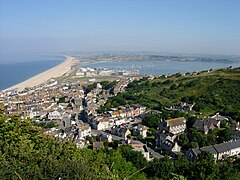Fleet Lagoon
| Chesil Beach Chesil Bank |
|
|---|---|

Chesil Beach viewed from the Isle of Portland
|
|
|
Chesil Bank shown within Dorset |
|
| Official name | Chesil Beach & The Fleet |
| Designated | 17 July 1985 |
| OS grid reference | SY635784 |
| Coordinates | 50°36′14″N 2°30′58″W / 50.604°N 2.516°WCoordinates: 50°36′14″N 2°30′58″W / 50.604°N 2.516°W |
Chesil Beach /ˈtʃɛzɪl/, sometimes called Chesil Bank, in Dorset, southern England is one of three major shingle structures in Britain. Its toponym is derived from the Old English ceosel or cisel, meaning "gravel" or "shingle".
The beach is often identified as a tombolo, although research into the geomorphology of the area has revealed that it is in fact a barrier beach which has "rolled" landwards, joining the mainland with the Isle of Portland, giving the appearance of a tombolo. The shingle beach is 29 kilometres (18 mi) long, 200 metres (660 ft) wide and 15 metres (50 ft) high. The beach and the Fleet are part of the Jurassic Coast, a UNESCO World Heritage Site, and the location for a 2007 novel, On Chesil Beach by Ian McEwan.
At the eastern end of the beach at the village of Chiswell, against the cliffs of the Isle of Portland, the beach curves round sharply to form Chesil Cove. This part of the beach protects the low-lying village from flooding. The beach has been the scene of many shipwrecks, and as such was named by Thomas Hardy as "Dead Man's Bay". Westwards the shingle forms a straight line along the coast, enclosing the Fleet, a shallow tidal lagoon.
The beach provides shelter from the prevailing winds and waves for the town of Weymouth and the village of Chiswell on Portland.
...
Wikipedia

